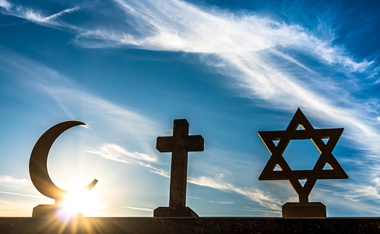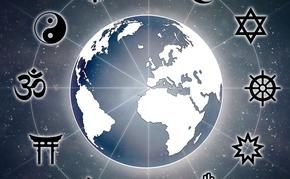The views expressed in our content reflect individual perspectives and do not represent the authoritative views of the Baha'i Faith.
Is Islam, as the Baha’i teachings contend, part of God’s redemptive plan for humanity? While some Westerners may have a hard time with that claim, the Bible itself offers the best evidence.
So, before we make that judgment, we need to consider what the Old and New Testaments say about the one who was promised to bring justice to the world.
RELATED: 4 Ways to Understand the Relationship of the Prophets
In that light, the Baha’i teachings revere Islam and its prophet, and illuminate the relationship between Judaism, Christianity, and Islam by clearly saying, as Baha’u’llah repeatedly did, that each of the messengers of God bear the same essential teachings:
Know then that, in as much as all the Prophets are but one and the same soul, spirit, name, and attribute, thou must likewise see them all as bearing the name Muhammad …
Understanding the history of religion can help us draw the parallels between the appearance of the founders of faith. In his Book of Certitude, Baha’u’llah defined the Baha’i concept of progressive revelation by favorably comparing the essential messages and messengers of both Faiths:
Every discerning observer will recognize that in the Dispensation of the Qur’an both the Book and the Cause of Jesus were confirmed. As to the matter of names, Muhammad, Himself, declared: “I am Jesus.” He recognized the truth of the signs, prophecies, and words of Jesus, and testified that they were all of God. In this sense, neither the person of Jesus nor His writings hath differed from that of Muhammad and of His holy Book, in as much as both have championed the Cause of God, uttered His praise, and revealed His commandments.
Let’s take a look at the Biblical support for this profound idea.
Who Was the Anointed One?
The Old Testament introduced the prophetic concept of an Anointed One – a Messiah – who would make the nations of the Earth God’s inheritance and the ends of the Earth His possession. Psalms 29 says the Messiah would rule the nations with an iron rod and dash opposition to pieces like pottery.
This sounds quite a bit like what Muhammad, a descendent of Abraham, actually did.
Further, the Psalms also say that the kings of the Earth would be warned to serve God with fear and trembling because this Chosen One could get angry at a moment’s notice and destroy them. This is what was promised; this is what Muhammad did.
The book of Isaiah repeated the theme that an Anointed One would come to order the nations of the Earth. In the end days, Isaiah 2:4 says, the Law would go out from Zion to judge the nations, rebuking many and establishing peace. If Zion is a heavenly domain, then the claim that Muhammad fulfilled the prophecy is considerable – because during his time Muhammad rebuked nations, ended idolatry, upheld the God of Jacob, and established justice.
The book of Isaiah goes on to announce a fierce judgment against Judah for practicing superstitions and joining hands with pagans to worship silver and gold and horses and idols. Biblical interpreters often say that Isaiah was speaking of the coming Assyrians and Babylonians – but the Assyrians and Babylonians did not judge Judah for worshipping idols, nor did they rid the land of idols, nor did they exalt the Lord. Muhammad did.
Isaiah’s verses also say that the Promised One was not to judge by what he saw nor by what he heard; but to judge with righteousness the needy, and give justice to the poor of the Earth, striking the Earth with the rod of his mouth; and with the breath of his lips slaying the wicked. This is exactly what Muhammad did. He judged in righteousness, brought justice to the poor, and the words from his mouth – the Qur’an – slayed the wicked.
The Hebrew Bible says, however, that the Promised One would be a descendant of Jesse. If Jesse refers to the father of David, then Muhammad cannot be considered the Anointed One. But Jesse, also rendered Isai or in Aramaic, Iyshay, is a contracted form of Ishmael (the son of Abraham and Hagar) and Muhammad was a descendant of Ishmael.
Prophecies about Muhammad in the New Testament
The Biblical verses that announce the coming of Muhammad do not stop in the Old Testament – in fact, they stretch deep into the New Testament.
Consider what the Book of Revelation in the New Testament says will happen at Christ’s return: a child would be born from the Law of God, a woman clothed with the sun, with the moon under her feet, and wearing a crown of twelve stars. This child was to rule with an iron scepter, just as we saw in the Old Testament, which implies a powerful ruler who would punish wrongdoers. This is what was promised; this is what Muhammad did.
Consider also the parable of the wedding feast for the king’s son, generally understood as a parable for what will happen when the Promised One comes and God is married to his people: The king (God) sent out messengers to invite people to the promised wedding. When these messengers were treated poorly, the king, the New Testament says, “sent his army and destroyed those murderers and burned their city.” This is what was promised; this is what Muhammad did.
The story of the wedding feast continues with the followers of the Promised One calling out the arrival of the heavenly reunion, the marriage of God and man in the promised society of justice and peace. But it notes that many of those who were supposed to attend, turned the invitation down and armies were sent against them. This is what was promised; this is what Muhammad did.
The New Testament also promised a special condemnation for idol-worshippers at the return of the Promised One. Keep in mind that the Quaraysh – the clan that ruled Mecca and rose up against Muhammad – were idol worshipers and made a great deal of profit promoting this practice. The Book of Revelation sent messages to the seven churches, which in the time of Muhammad were part of the Byzantine Empire which Islam would soon conquer.
RELATED: Are the Major Faiths Actually One Faith?
The Rest of the Story
If we are fair, we must conclude that Muhammad fulfilled much of the Biblical promises of the Promised One.
For about 500 years Islam was clearly the light of the world. In places like India, the light stretched through to the 16th century. Under the vast Islamic protectorate, Christians, Jews, Muslims, and Hindus lived, worked, and even discussed theology together. Throughout the empire laws were established, and justice was served, and in the great cities that Muslims captured or built – Alexandria, Antioch, Damascus, Baghdad, Cordova, Granada, Toledo, Tabriz, Lahore, Delhi, Agra and many others – great libraries and universities were established, hospitals were built, the poor received care, sciences and arts advanced, peace was established, and the Kingdom of God was partially built.
If we want to have peace in our times we must grant Islam its due and recognize there is no god but God and Muhammad was His messenger. There are, however, new Messengers to consider. The Seal has been broken and the prophecies have come true: the Promised Day has come.
















Comments
Sign in or create an account
Continue with Googleor